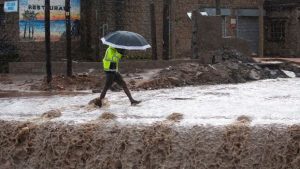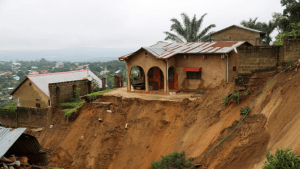The South African Weather Service (SAWS) has issued a heatwave warning across several parts of the country as hot temperatures are expected to continue until Sunday.
SAWS says the mercury is expected to hit the high thirties in some areas.
Meanwhile, the European climate change watchdog has found that September 2023 was the hottest September ever recorded due to climate change.
The International Weather and Climate Forum is currently holding workshops in Paris, France for weather presenters, meteorologists, and journalists on how to communicate more effectively on climate change, both to viewers and to policy makers.
SABC Meteorologist Azwi Tuwani says, “Climate change is happening, and we need to know how to mitigate and to be resilient to it. So, this is where our meteorologists and weather presenters are in the forefront, hence this kind of training where we are looking at many factors in how we can better communicate and educate the viewers on the issues of climate change. In SA right now, we have a heatwave, and we need to have water in such situations, including serious droughts. The last events we had in Western Cape, the storm surge and the flooding because it has been exacerbated and we can see the footprint of climate change.”
International Weather and Climate Forum currently holding workshops in Paris: Azwi Tuwani
#FIMC2023 🌍#Colloque
📢 C’est demain !“Comment dialoguer sur nos transformations futures ?”#Dialogues #Récits #transitionécologique 📍@citedessciences 🗣️🇫🇷🇬🇧 🫂Présentiel/livestream📲
ℹ️ https://t.co/0IJQFlBRTZ pic.twitter.com/tPqqT2SQYT
— Forum Météo Climat #FIMC2023 🌎 #RestonsPrudents (@Forumeteoclimat) October 5, 2023
SA Weather Report | 06 October 2023:
Contributing factors
Project Manager for Climate Justice at the Rosa Luxemburg Stiftung, Roland Ngam, says greenhouse gas emissions, deforestation and industrial revolution, amongst others, are some of the contributing factors to dangerously high temperatures experienced globally.
European Union’s Copernicus Climate Change Service says this year is on track to become the hottest since at least 1940.
Scientists say climate change, combined with this year’s El Nino weather pattern that warms surface waters in the eastern and central Pacific Ocean, have fuelled recent record-breaking temperatures.
Ngam says people who live in flood and disaster-prone areas will feel the impacts of global warming more.
“The world has increased in temperatures since the beginning of the industrial revolution. We have been cutting down trees, digging the earth for fossils and so on and that aspect, combined with El Nino which happens every few years, has combined to heat up the world and what we are experiencing is stuff that usually happens 1 000 years but unfortunately now we are experiencing it more regularly.”






